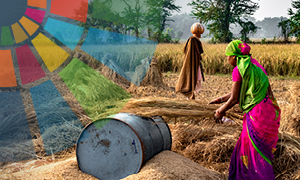The commons (natural resources held and used collectively) support food systems through direct production and provision of water, food, fuel, fodder, pollination, and other key ecosystem services, and are also important sources of resilience for communities. They thus contribute to nature-positive solutions and advance equitable livelihoods. Yet the commons are under pressure from encroachment and overuse.
In a July 7 UNFSS Science Days side event, co-organized by IFPRI and the Foundation for Ecological Security (FES, India), with the University of South Australia and Azim Premji University, researchers and practitioners presented evidence from a new study of the value of ecosystem services from the commons in India, and discussed how strengthening governance of the commons can support equitable food systems. The study and event build on the April UNFSS Dialogue on Women, Work and Food Systems that identified protection and effective management of the commons as game-changing solution for food system transformation.
Harpinder Sandhu, a Senior Lecturer at the University of South Australia, presented the collaborative study, followed by an overview of the FES Promise of Commons initiative by FES Senior Program Manager Pratiti Priyadarshini. Harini Nagendra, Director of Research Center at Azim Premji University, and Insa Theesfeld, in her capacity as the president of the International Association for the Study of the Commons, discussed the importance of safeguarding and restoring the commons and going beyond economic valuation of ecosystem services.
Several key takeaways from the discussion emerged around the themes of valuing the commons and how to counter misunderstandings about the important role they play in food systems.
Valuing the commons: The foundation of food systems
- A third of India’s population, especially marginalized groups, depends on the commons. Yet, common lands have faced significant decline over the past 50 years, resulting in biodiversity losses, land degradation, and acute water scarcity.
- Most commons are undervalued: Their economic worth is unknown, and they are not considered in national accounts or GDP. Valuation of the many ecosystem services they provide can help estimate their contribution to livelihoods and the planet.
- The study, which is based on a systematic review of the literature, identified 34 ecosystem services (12 provisioning, 12 regulating, six cultural, and four supporting services) provided by the Indian commons.
- Food, water, fish, honey, fuelwood, and fodder are some of the provisioning services that contribute directly to food systems. The six supporting services (such as soil formation, nutrient cycling, and habitats for species gene pools) and the 12 regulating services (such as pollination, climate regulation, and soil fertility) play an essential role in creating those provisioning services for food systems.
- The study estimated that the 66.6 million hectares of commons in India provide ecosystem services worth at least $90.5 billion per year. In comparison, agriculture generates $271 billion of gross value from 159 million ha.
Repositioning the narrative of the tragedy of the commons
- Communities often lack secure tenure to the commons, which are frequently perceived as “wastelands” and converted to other land uses, despite providing value to community and society, sequestering carbon, and contributing to agriculture.
- FES aims to convert the narrative of the tragedy of commons to one of the “Promise of Commons” by positioning communities as stewards of commons, working directly with thousands of communities in 10 states and partnership with government and others.
- Valuation of commons is key to drawing attention to these issues and soliciting support from policymakers.
- In India, directing funds from the National Rural Employment Guarantee Scheme toward restoration of commons is a benefits multiplier.
Avoiding a reductionist approach to valuing commons
- Commons play a foundational role as inputs and outputs in food systems along agricultural value chains, not only in rural areas but also in peri-urban and urban areas.
- Climate change influences migration in India. Slightly better-off families are the ones who can migrate, while the poorest are left behind, and these households increasingly depend on the commons.
- We often tend to think of commons as rural. Yet urban and peri-urban commons are disappearing the fastest. Peri-urban areas in the global south suffer huge environmental degradation, while being very important for food security.
- All panelists stressed that the social and ecological values of ecosystem services are even more important than the economic values, however economic valuation is a powerful argument for policymakers to show what is at stake.
- Any estimates of ecosystem services are underestimates; new measures are needed to capture other valuable spill-over effects of ecosystem services, including mental health.
Hagar ElDidi is a Research Analyst with IFPRI’s Environment and Production Technology Division (EPTD); Ruth Meinzen-Dick is an EPTD Senior Research Fellow.







